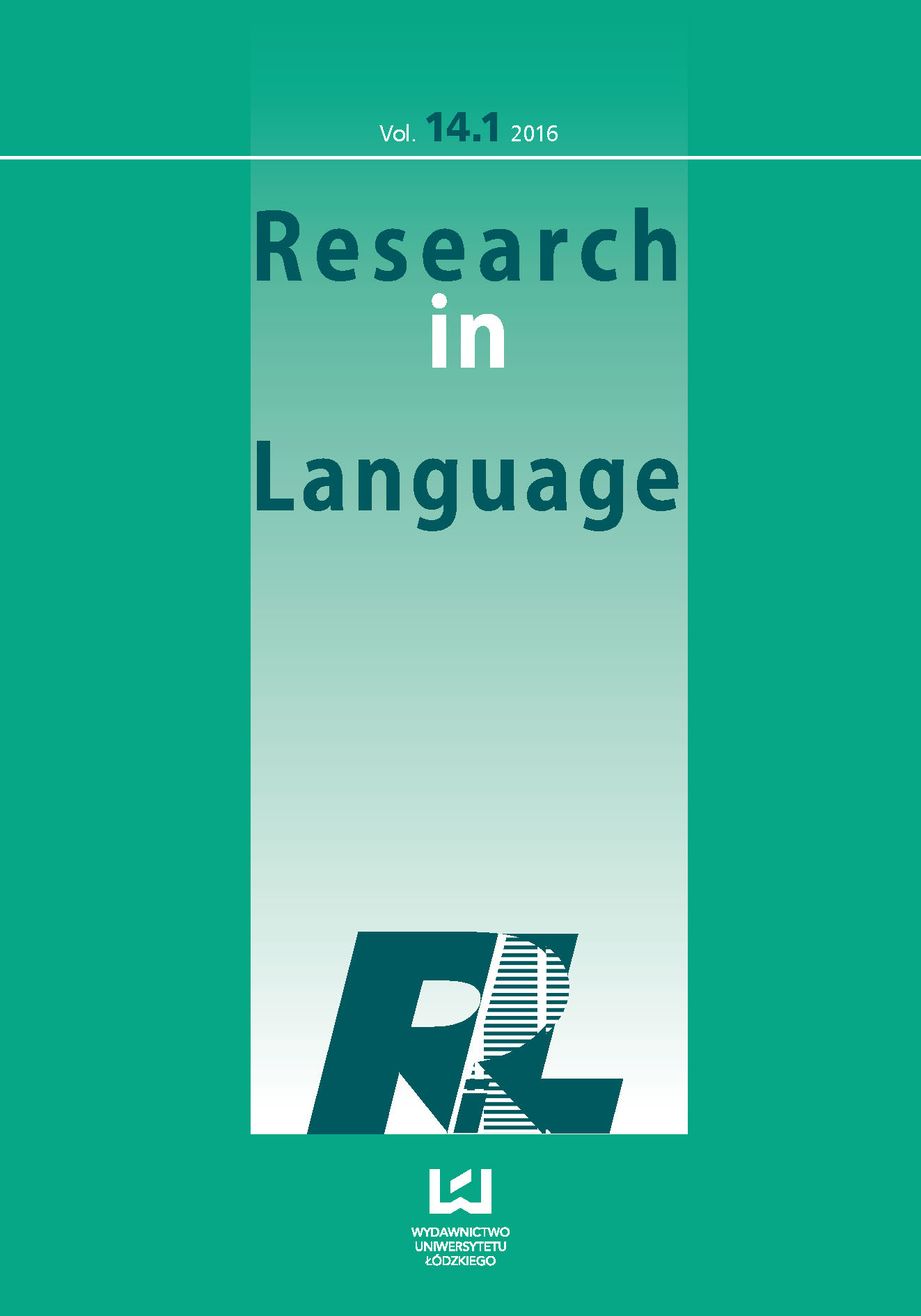Spectral dynamics in L1 and L2 vowel perception
DOI:
https://doi.org/10.1515/rela-2016-0004Keywords:
Vowel perception, dynamic specification, Polish, L2 EnglishAbstract
This paper presents a study of L1 and L2 vowel perception by Polish learners of English. Employing the Silent Center paradigm (e.g. Strange et al. 1983), by which listeners are presented with different portions of a vowel, a force choice identification task was carried out. Due to differences in the vowel systems of the two languages, it was hypothesized that stimulus type should have minimal effects for L1 Polish vowel perception since Polish vowels are relatively stable in quality. In L2 English, depending on proficiency level, listeners were expected to adopt a more dynamic approach to vowel identification and show higher accuracy rates on the SC tokens. That is, listeners were expected to attend more to dynamic formant cues, or vowel inherent spectral change (VISC; see e.g. Morrison and Assmann 2013) in vowel perception. Results for identification accuracy for the most part were consistent with these hypotheses. Implications of VISC for the notion of cross-language phonetic similarity, crucial to models of L2 speech acquisition, are also discussed.
References
Aperliński, G. and G. Schwartz. 2015. Release bursts vs. formant transitions in Polish stop place perception. In The Scottish Consortium for ICPhS 18 (ed.), Proceedings of the 18th International Congress of Phonetic Sciences.
Google Scholar
Bohn, O.-S. 1995. Cross language speech perception in adults: First language transfer doesn’t tell it all. In W .Strange (ed.), Speech perception and linguistic experience: Theoretical and methodological issues, 279-304. Timonium, MD: York Press.
Google Scholar
Escudero, P. and P. Boersma. 2004. Bridging the gap between L2 speech perception research and phonological theory. Studies in Second Language Acquisition 26, 551-585.
Google Scholar
Fox, R. A. and E. Jacewicz. 2009. Cross-dialectal variation in formant dynamics of American English vowels. Journal of the Acoustical Society of America 126, 2603–2618. doi:10.1121/1.3212921
Google Scholar
Flege, J. E. 1987. The production of ‘new’ and ‘similar’ phones in a foreign language: Evidence for equivalence classification. Journal of Phonetics 15, 47-65.
Google Scholar
Flege, J. E. 1995. Second language speech learning: Theory, findings, and problems. In W. Strange (ed.), Speech perception and linguistic experience: Theoretical and methodological issues, 233-277. Timonium, MD: York Press.
Google Scholar
Jekiel, M. 2001. Dynamic information for Polish and English vowels in syllable onsets and offsets. Unpublished B.A. thesis, Adam Mickiewicz University in Poznań.
Google Scholar
Hansen-Edwards, J.G. 2008. Social factors and variation in production in L2 phonology. In J. G. Hansen Edwards and M. Zampini (eds.), Phonology and second language acquisition, 251-279. Amsterdam: John Benjamins.
Google Scholar
Hillenbrand, J. 2013. Static and dynamic approaches to vowel perception. In G. Morrison and P. Assmann (eds.), Vowel inherent spectral change, 9-30. Berlin: Springer.
Google Scholar
Jenkins, J. J. and W. Strange. 1999. Perception of dynamic information for vowels in syllable onsets and offsets. Perception and Psychophysics 61, 1200–1210.
Google Scholar
Jenkins, J.J., Strange, W. and T. R. Edman. 1983. Identification of vowels in ‘vowelless’ syllables. Perception and Psychophysics 34, 441-450.
Google Scholar
Jin, S. H. and C. Liu. 2013. The vowel inherent spectral change of English vowels spoken by native and non-native speakers. Journal of the Acoustical Society of America 133 (5), 363-369. Available from: http://dx.doi.org/10.1121/1.4798620
Google Scholar
Ladefoged, P. and I. Maddieson. 1996. The Sounds of the World’s Languages. Oxford: Blackwell.
Google Scholar
McClure, J. D. 1977. Vowel duration in a Scottish accent. Journal of the International Phonetic Association 7, 10-16.
Google Scholar
Rogers, C. L., M. Glasbrenner, T. DeMasi and M. Bianchi. 2013. Vowel inherent spectral change and the second language learner. In G. S. Morrison and P. Assmann (eds.), Vowel Inherent Spectral Change, Modern Acoustics and Signal Processing, 231-259. Berlin/Heidelberg: Springer-Verlag.
Google Scholar
Rojczyk, A. 2011. Overreliance on duration in nonnative vowel production and perception: The within lax vowel category contrast. In M. Wrembel, M. Kul and K. Dziubalska-Kołaczyk (eds.), Achievements and perspectives in SLA of speech: New Sounds 2010, vol. 2, 239-249. Bern: Peter Lang.
Google Scholar
Schwartz, G. and G. Aperliński. 2014. The phonology of CV transitions. In E. Cyran and J. Szpyra-Kozłowska (eds.), Crossing Phonetics-Phonology Lines, 277-298. Newcastle: Cambridge Scholars Publishing.
Google Scholar
Schwartz, G., A. Balas and A. Rojczyk. 2014. Stop release in Polish English – implications for prosodic constituency. Research in Language 12(2), 131-144.
Google Scholar
Schwartz, G. 2015. Vowel dynamics for Polish learners of English. In E. Waniek-Klimczak and M. Pawlak (eds.), Teaching and Researching the Pronunciation of English - Studies in Honour of Włodzimierz Sobkowiak, 205-217. Berlin: Springer.
Google Scholar
Strange, W. 1989. Evolving theories of vowel perception. Journal of the Acoustical Society of America 85, 2081- 2087.
Google Scholar
Strange, W., J. Jenkins and T. Johnson. 1983. Dynamic specification of coarticulated vowels. Journal of the Acoustical Society of America 34, 695-705.
Google Scholar
Strange W., R. Verbrugge, D. P. Shankweiler and T. R. Edman. 1976. Consonantal environment specifies vowel identity. Journal of the Acoustical Society of America 60, 213-224.
Google Scholar
Święciński, R. 2004. Articulatory setting in Polish and its implications for teaching English pronunciation to Poles. In W. Sobkowiak and E. Waniek-Klimczak (eds.), Dydaktyka fonetyki języka obcego. Zeszyt Naukowy Instytutu Neofilologii Państwowej Wyższej Szkoły Zawodowej w Koninie nr 3, 141-150 Konin: Wydawnictwo PWSZ w Koninie.
Google Scholar
Volin, J., M. Uhrinova and R. Skarnitzl. 2012. The effect of word-initial glottalization on word monitoring in Slovak speakers of English. Research in Language 10, 173-181.
Google Scholar
Williams, D. and P. Escudero. 2014. A cross-dialectal acoustic comparison of vowels in Northern and Southern British English. Journal of the Acoustical Society of America 136 (5), 2751-2761.
Google Scholar
Wright, R. 2004. Perceptual cue robustness and phonotactic constraints. In B. Hayes, R. Kirchner and D. Steriade (eds.), Phonetically Based Phonology, 34-57. Cambridge: Cambridge University Press.
Google Scholar
Downloads
Published
How to Cite
Issue
Section
License
Copyright (c) 2016 © Copyright by Authors, Łódź 2016; © Copyright for this edition by Uniwersytet Łódzki, Łódź 2016

This work is licensed under a Creative Commons Attribution-NonCommercial-NoDerivatives 4.0 International License.










